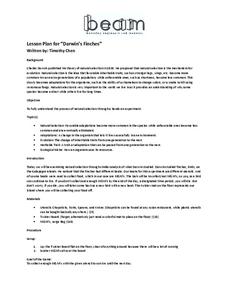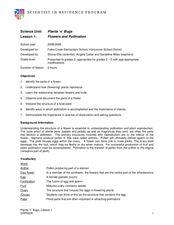Curated OER
Beyond Organic?
Students examine the critiques of organic agriculture and its production and marketing approaches. In this sustainable agriculture lesson students study how the ideas about ethics of the food system are changing.
Berkeley Engineering and Mentors
Darwin's Finches
Try a twist on the old finch beak and chopsticks activity by using M&Ms on a Twister mat. Spoons, knives, forks, and chopsticks represent beaks and are randomly assigned to your little birds, who must collect as much food as possible...
Curated OER
EcoFluxx
Students describe examples of predator/prey relationships in nature explain how some animals protect themselves from predation better follow all directions presented to them become more flexible, adaptable and literate learners. They...
Curated OER
Insect Biology and Ecology: A Primer
Pupils explore insects and closely related organisms. They examine the growth and development of a lady beetle. Students classify insects and organize them. They investigate pest management.
Curated OER
Flowers and Pollination
Students explore the environment by researching plant reproduction. For this pollination lesson, students define botany related vocabulary terms such as disc flower, petal and fertilization. Students dissect a flower with their...
Curated OER
Visual Vocabulary
Students interpret and name the vocabulary termed acted out by the mime. In this science/language arts/physical education lesson, students are given a set of vocabulary terms to discuss within their group. Next, students place all...
Curated OER
Population Biology
Young scholars define the following terms: predation, competition, carrying capacity and population. They can explain the patterns of growth and the limitations of growth. Students explain the difference between density-dependent and...
Curated OER
I See a Coyote
Students role-play coyotes looking for natural resources. In this natural resources lesson, students examine the relationship between animal life and the environment. Students play a game that demonstrates how natural resources affect...
Curated OER
Living in Extreme Environments: Havens on the Deep Sea Floor
Students identify the characteristics of an extreme environment in the deep ocean and consider what organisms need to survive in these elements. They research sampling and data collection methods in this environment.
Curated OER
Blue Mud Shrimp Mystery
Students explore invasive species on an environment. In this exploratory lesson students hypothesize why shrimp are on the decline and make a brochure or poster showing their results.
Curated OER
"Julie of the Wolves"
Fifth graders research life in Alaska and compare life there to their lives in this instructional activity. They read "Julie of the Wolves." They research through the novel and other reference books facts about the Alaskan climate and...
Curated OER
Living in Extreme Environments
High schoolers examine the characteristics of the ocean floor and the importance of of extreme environments. In this investigative instructional activity students use four methods to sample populations, gather, record and analyze data...
Curated OER
How Appropriate is that Tree?
Young scholars identify trees and their environments using a dichotomous chart. In this exploratory lesson students use the Internet to identify conditions needed for the trees and what the climate is in their area.
Curated OER
Birds: Wetlands Ecosystems
In this birds worksheet, students click on the links to learn about the birds of the Wetlands and answer short answer questions about it. Students complete 7 questions total.
Curated OER
Optimal Foraging
Students participate in a foraging activity that demonstrates environmental conditions playing an important role in determining the optimal foraging behavior of a particular organism.
Curated OER
Environment: Mealworm Observations
Learners observe plant and animal growth and participate in class discussions about the subjects. They also record their observations in a log. Using observation and the scientific method, they describe the characteristics of mealworms.
TED Talks
Ted: Ted Ed: Why Wildfires Are Necessary
Our early ancestors relied on lightning to cause forest fires, from which they could collect coals and burning sticks to help them cook food and clear land. Yet, it wasn't just humans who benefited from these natural phenomena. Even as...
Georgia Department of Education
Ga Virtual Learning: Ecosystems
This module offers an in depth study of the fundamental components of ecosystems. Activities include mini-lessons with videos and student assignments.



















